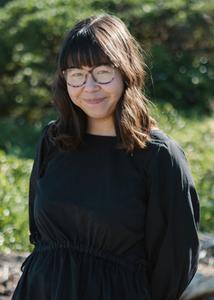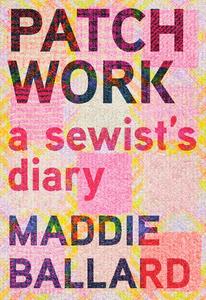
|
|
| photo: Celeste Fontein | |
Maddie Ballard is the author of Patchwork: A Sewist's Diary (Tin House, October 21, 2025), a collection of essays about sewing and textiles. Her creative nonfiction has appeared in publications including Wasafiri, Landfall, and the Oxford Review of Books, and she writes a Substack newsletter. Born in Syracuse, N.Y., she grew up in Aotearoa New Zealand and now lives in Melbourne, Australia.
Handsell readers your book in 25 words or less:
Patchwork: A Sewist's Diary is a memoir about learning to sew. It tells the story of making 17 garments, alongside a story of growing up.
On your nightstand now:
I'm currently reading the diaries of Helen Garner--I picked them up thinking I should read some Australian literature, having just moved to Melbourne. They're wonderful: full of gossip, tenderness, believable foible, and lines like "I am the only person in the world who carries round an inventory of my crimes. Everyone else is busy with their own."
I'm also loving No Good, the debut collection by U.S.-schooled Aotearoa New Zealand poet Sophie van Waardenberg. I think her poems about love and death are extraordinary--lyrical without being cloying; precise without being fussy. Seek it out!
Favorite book when you were a child:
I Capture the Castle by Dodie Smith. I must have read this 20 times. Twelve-year-old me loved the crumbling English castle setting and the story of two sisters finding their way out of penury. The novel's ending is still one of my favourites ever.
Your top five authors:
Virginia Woolf. Every one of her books has meant something important to me, and she writes my favourite long-breathed sentences of all time (consider the first sentence of her essay "On Being Ill"!)
Elif Batuman. I just think she's hilarious and brilliant--all her books, and her articles and interviews too. There's a scene in her first book, The Possessed, where she unexpectedly finds herself judging an adolescent boys' leg contest while on exchange in Hungary. I laughed so much the first time I read it, I had to get off the bus. I'd probably explode if I ever met her.
James Baldwin. For his intelligence, his melancholy, his courage, the beautiful sonorous way he puts sentences together. I count myself so lucky to have lived after Baldwin.
Janet Malcolm. I'm so jealous of Malcolm's voice--her piercing insight, her ironic edge--and her formidable skill as a journalist.
Shakespeare. Is this a cop-out? I hope not. It would feel false not to include him in this list; early encounters with his wild, sumptuous language were so much a part of the reason I wanted to write at all.
Book you've faked reading:
At one point I pretended to read Rabbit, Run by John Updike to impress a boy. I found it unreadably male... this should have been a sign.
 Book you're an evangelist for:
Book you're an evangelist for:
All Our Yesterdays by Natalia Ginzburg. I read this for the first time last year and was stunned by its rolling, musical, wry voice, telling the story of a family doing its best to survive the Second World War in Fascist Italy. So many profound asides: "Cenzo Rena said that no one found himself with courage ready-made, you had to acquire courage little by little, it was a long story and it went on almost all your life." I wished it would never end.
Book you've bought for the cover:
Pure Colour by Sheila Heti. I mean...!
Book you hid from your parents:
I'm not sure there's a book in this category! I was very lucky to have big readers for parents, who encouraged me to read widely.
Book that changed your life:
Mrs Dalloway by Virginia Woolf. When I first read this novel, for an undergraduate English paper, it changed the whole way I thought about books. I thought it was crazily beautiful; I still do. In turn, the paper was taught by an American professor whose radiance and intelligence were totally glamorous to me. Her example was what set me on a path towards graduate study in literature, which is what sent me to England, which is what led me to journalism, and then essays, and wanting to write prose at all.
Favorite line from a book:
"If I loved you less, I might be able to talk about it more," from Jane Austen's Emma.
Five books you'll never part with:
Howards End by E.M. Forster. This is by no means a flawless novel, and I agree with many of the accusations lobbied against it about class snobbery, but I also love it more than I can ever reasonably explain. More (if only just) than Middlemarch or Tess of the d'Urbervilles, more than The Portrait of a Lady or Persuasion or Jane Eyre. Something to do with its voice, I think--the impossible Englishness of the diction and syntax, the way it offers its deepest observations with lightness and wit, its warmth.
Lucy by Jamaica Kincaid. This novel tells a story I'll never tire of hearing: a young woman leaves her home country and is forced to reflect on her race, sexuality, and family in a new context. But it tells it so exquisitely--there's not one word out of place.
The Book of Delights and the follow-up The Book of (More) Delights by Ross Gay. I'm always dipping into these books of "essayettes" about joy. I love Gay's earnestness and curiosity, and his resistance to being embarrassed by those qualities. And the sheer maximalist fun of some of the language! About El DeBarge's Tiny Desk performance: "though I am hyperbolic by nature and design, [it] is unhyperbolically one of the most beautiful things I've ever seen." About a fly: "its wings hauling all the light in the room." About the flared handle of a cup: "as though designed for the romance between the thumb and index finger that holding a cup can be."
The Red Tenda of Bologna by John Berger. This short book follows a man wandering through the city of Bologna after his beloved uncle, who adored the city of Bologna, has died. In every particular it is a perfect text. I think about it all the time.
Zami by Audre Lorde. God, this is a beautiful and generous book. I'll be rereading it all my life.
Book you most want to read again for the first time:
Minor Feelings by Cathy Park Hong. Reading this book was the first time I'd seen certain ideas about the Asian immigrant experience articulated--for example, the sense that writers of colour had to "behave better in their poetry and in person" so white people would feel comfortable enough to sympathise; or the idea that "one characteristic of racism is that children are treated like adults and adults are treated like children." I felt so seen, which made me realise I usually don't. The conversation has progressed a lot since 2020, but I think I remain indebted to this book for much of my scaffolding.

